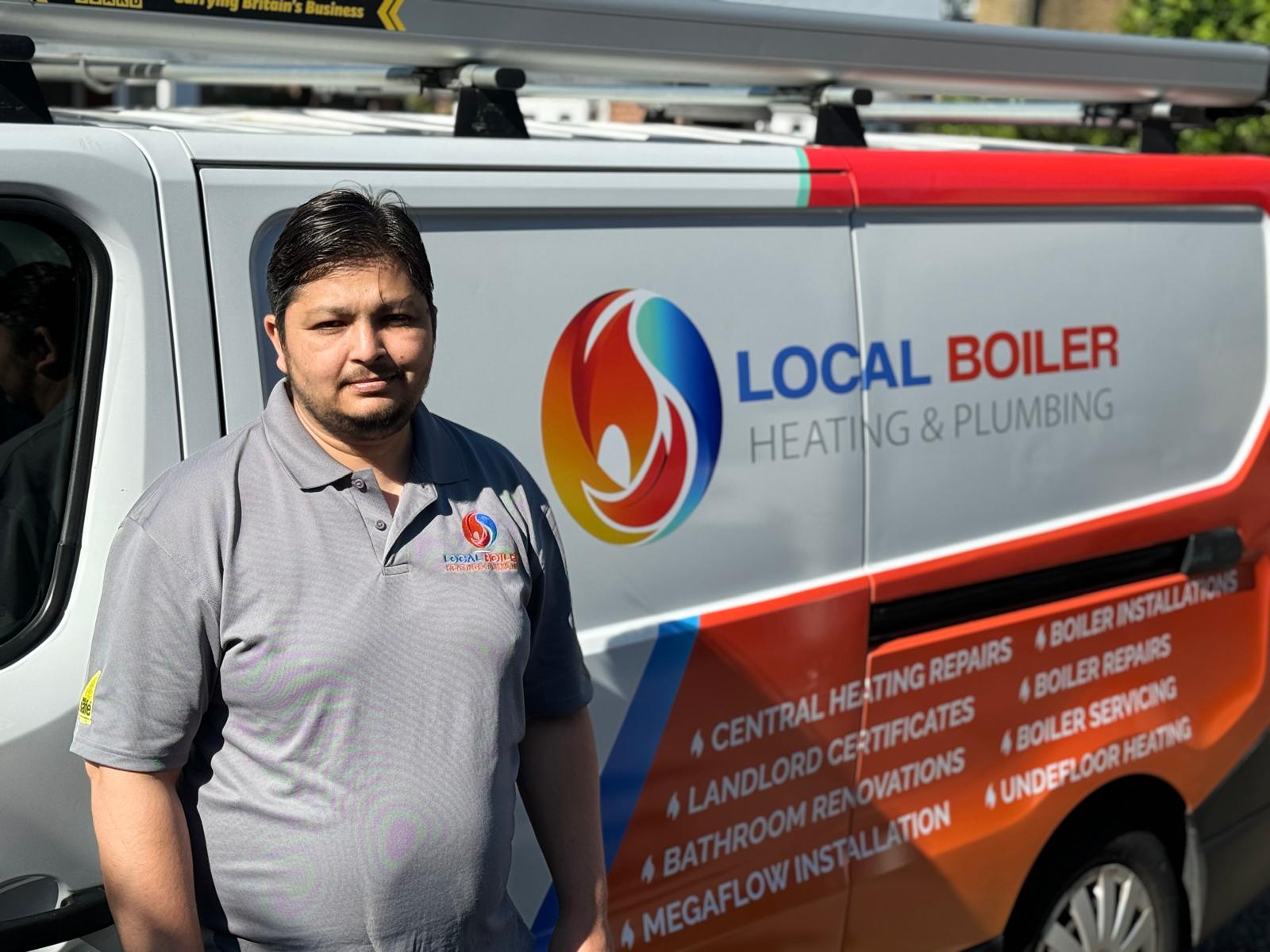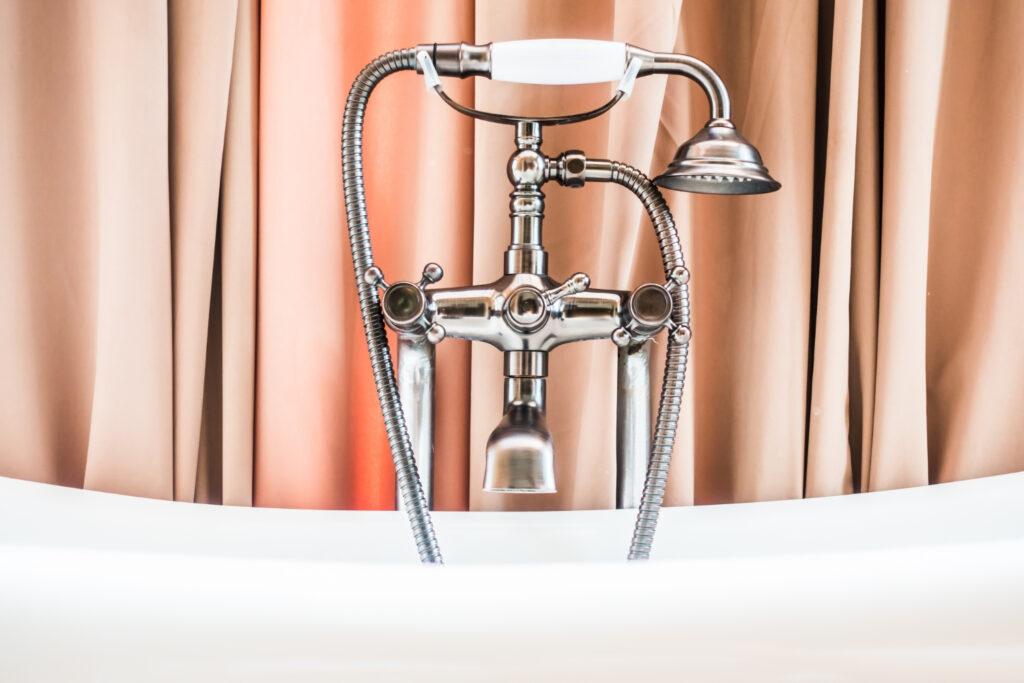If you have a combi boiler system at home, finding the right shower that will provide you with comfort, suitable water pressure and temperature, and an adequate supply of hot water can be a tricky process. It is very important to consider the compatibility between showers and boilers and find the right shower system that works for your family’s needs and day to day routines in the household.
After all, 14.4 million UK homes have a combination boiler, so finding the right combination of boiler and shower can make a significant difference. In this guide, we will help you find out which showers are compatible with combi boilers and what you need to know about this type of shower system.
Understanding Combi Boilers and Water Systems
Before we begin to look at shower compatibility, let’s briefly explain what a combination boiler is and how it works in your home. Combination boilers (or ‘combi’ boilers as they are more commonly known) are central heating systems that work without the need for a separate hot water cylinder and cold water tank. Instead, a combi boiler works by providing both heat and hot water from your mains water supply, on demand.
A combi boiler works by heating cold water from your mains as it passes through its heat exchanger when you open a hot tap or turn on your shower. The result is that you don’t need to wait for a hot water cylinder to fill up and reheat water, it is available to you almost instantly. For this reason, combi boilers are a very popular option for UK homes today.
The issue with combi boilers is that your flow rate and pressure for hot water will be reliant upon your mains water pressure and the output capacity of your boiler itself. This, as you will see, is a key factor in the types of showers that will work well with combi boilers.
The Best Shower Types for Combi Boilers
Mixer Showers: The Perfect Match
Mixer showers represent the ideal shower solution for most combi boiler installations. These showers work by blending hot water from your boiler with cold water from the mains supply, allowing you to achieve the perfect temperature whilst maintaining consistent pressure.
Thermostatic Mixer Showers
Thermostatic mixer showers offer the ultimate in safety and comfort for combi boiler systems. These sophisticated units automatically adjust the hot and cold water ratio to maintain your selected temperature, even when water pressure fluctuates elsewhere in the house.
The key advantages include:
- Automatic temperature regulation prevents scalding
- Consistent shower experience regardless of pressure variations
- Built-in safety features shut off water if hot supply fails
- Works efficiently with standard combi boiler pressure (1-3 bar)
Manual Mixer Showers
Manual mixer showers provide a more budget-friendly option whilst still offering excellent compatibility with combi boilers. These units require manual adjustment to achieve desired temperatures but still deliver reliable performance when properly matched to your boiler’s output.
Digital Showers: Modern Innovation
Digital shower systems have gained popularity in recent years, offering precise temperature control through electronic interfaces. These showers work exceptionally well with combi boilers because they’re designed to operate effectively at mains pressure.
Digital showers typically feature:
- Precise temperature control to within one degree
- Memory settings for different family members
- Remote control operation options
- Enhanced safety features with automatic shutdown
Shower Types to Approach with Caution
Electric Showers: Limited Compatibility
Electric showers present a unique situation when paired with combi boilers. Whilst technically possible to install, they essentially bypass your boiler entirely by heating cold mains water using electricity. This setup means you’re paying to run your boiler for heating whilst separately powering an electric shower for hot water.
Considerations for Electric Showers:
- Higher electricity costs compared to gas heating
- Limited flow rates (typically 6-10 litres per minute)
- Requires dedicated electrical circuit installation
- May not provide adequate pressure for satisfying showers
Power Showers: Generally Incompatible
Power showers, which use pumps to boost water pressure, are typically incompatible with combi boilers. Since combi systems operate at mains pressure without storage tanks, adding a pump can cause pressure imbalances and potential damage to your boiler.
Most manufacturers explicitly warn against connecting power showers to combi boiler systems, as the pumps can:
- Create negative pressure affecting boiler operation
- Cause premature wear on boiler components
- Void manufacturer warranties
- Lead to inconsistent water temperatures
Key Factors Affecting Shower Performance with Combi Boilers
Water Pressure Requirements
Understanding your home’s water pressure is crucial for selecting compatible showers. Most combi boilers operate optimally between 1-3 bar pressure, and your shower choice should complement this range rather than fight against it.
Measuring Your Water Pressure:
- Use a pressure gauge on an outside tap
- Check multiple outlets throughout your home
- Consider seasonal variations in mains pressure
- Account for peak usage times in your area
Flow Rate Considerations
Your combi boiler’s flow rate determines how much hot water it can produce per minute. This specification, measured in litres per minute, directly impacts your shower’s performance and should influence your shower selection.
Typical Combi Boiler Flow Rates:
- Compact boilers: 9-12 litres per minute
- Standard boilers: 12-18 litres per minute
- High-output boilers: 18+ litres per minute
Temperature Rise and Recovery
The temperature rise capability of your boiler affects how quickly it can heat incoming cold water to your desired shower temperature. During winter months, when mains water temperatures drop, your boiler works harder to achieve the same shower temperature.
Installation Considerations and Best Practices
Professional Assessment Requirements
Before installing any shower system with your combi boiler, a professional assessment ensures compatibility and optimal performance. Qualified heating engineers can evaluate your specific setup and recommend the most suitable shower options.
Key Assessment Areas:
- Current boiler capacity and condition
- Existing pipework configuration
- Water pressure throughout the property
- Electrical supply requirements
- Building regulations compliance
Pipework and Positioning
Proper pipework installation significantly impacts shower performance with combi boilers. The route between your boiler and shower affects both pressure delivery and temperature consistency.
Optimal Pipework Practices:
- Minimise pipe runs between boiler and shower
- Use appropriate pipe diameters (typically 22mm for hot supply)
- Insulate hot water pipes to reduce heat loss
- Position shower valves for easy access and maintenance
Safety and Regulation Compliance
All shower installations must comply with current UK building regulations and safety standards. This includes proper earthing, adequate ventilation, and appropriate safety devices.
Also Read: Fitting a Mixer Shower with a Combi Boiler
Common Issues and Troubleshooting Solutions
Temperature Fluctuation Problems
Temperature variations during showering often indicate compatibility issues between your shower and boiler setup. Several factors can contribute to this frustrating problem.
Common Causes and Solutions:
• Inadequate boiler output: Upgrade to higher capacity boiler or reduce simultaneous hot water demand
• Poor pipework design: Reconfigure pipes to reduce heat loss and improve flow rates
• Thermostatic valve issues: Service or replace faulty mixing valves
• Pressure variations: Install pressure reducing valves or accumulator tanks where appropriate
• Scale build-up: Regular system maintenance and descaling procedures
Low Pressure Issues
Insufficient water pressure affects shower performance and indicates potential system problems requiring attention.
Pressure Improvement Strategies:
• Mains pressure evaluation: Contact water supplier if pressure consistently below 1 bar
• Internal pipework assessment: Replace narrow or corroded pipes restricting flow
• Boiler service requirements: Annual maintenance ensures optimal pressure delivery
• Isolation valve checks: Ensure all valves fully open and functioning correctly
• Filter cleaning: Regular cleaning of system filters and strainers
Flow Rate Limitations
When shower flow rates disappoint, several factors within the combi system may require attention.
Flow Enhancement Options:
• Boiler capacity matching: Select shower heads appropriate for boiler output
• Pipework diameter upgrades: Install larger diameter supply pipes where beneficial
• Multiple outlet management: Coordinate household water usage during peak times
• Regular maintenance schedules: Keep system components clean and efficient
• Professional optimisation: Annual system reviews identify improvement opportunities
How Local Boiler Helps You Navigate Shower Compatibility
Deciding which showers are compatible with your combi boiler can be complex and it’s often helpful to seek professional advice. If you live in the UK, then look no further than Local Boiler. They provide a range of services aimed at helping homeowners understand their heating system and choose the right fixtures and fittings.
The knowledgeable engineers at Local Boiler will inspect your combi boiler installation to assess its performance and advise you on the most appropriate shower options available for your home. They will also take the time to explain their recommendations so that you can make an informed decision without feeling pressured to buy a specific product.
Local Boiler recognize that every home is different with varying needs depending on whether you live in an old Victorian terrace or a modern flat – each comes with its own set of challenges including older pipework or limited space which needs to be considered when selecting a new shower system; their expert advice takes these factors into account to help you make choices based on both budget and expected performance.
Energy Efficiency Considerations
- Optimising Hot Water Usage
Selecting the right shower for your combi boiler impacts both comfort and energy costs. Understanding how different shower types affect your gas consumption helps make economically sound decisions.
Modern thermostatic mixer showers often include eco-features that reduce hot water consumption without compromising the showering experience. These features include flow restrictors, temperature limiters, and pause buttons that temporarily stop water flow whilst maintaining temperature settings.
- Long-term Cost Analysis
When evaluating shower options for combi boiler systems, consider long-term operational costs alongside initial installation expenses. Higher-quality mixer showers typically offer better temperature control and flow management, resulting in reduced energy waste and lower monthly bills.
The investment in a quality thermostatic mixer shower often pays for itself through reduced gas consumption and extended boiler life. Consistent temperature control means less time spent adjusting settings, reducing overall water and energy usage.
Maintenance and Longevity Tips
Regular System Care
Maintaining your combi boiler and shower system ensures optimal performance and extends equipment lifespan. Regular maintenance prevents common issues that affect shower performance and helps identify potential problems before they become expensive repairs.
Essential Maintenance Tasks:
• Annual boiler servicing: Professional inspection and cleaning maintains efficiency
• Shower head cleaning: Regular descaling prevents flow restriction and temperature issues
• Pipework inspection: Check for leaks, corrosion, or damage affecting performance
• Thermostatic valve testing: Verify safety features function correctly
• System pressure monitoring: Maintain optimal pressure levels throughout the year
Seasonal Considerations
UK weather patterns affect both mains water temperature and heating system performance. Understanding these variations helps maintain consistent shower performance year-round.
During winter months, incoming mains water temperatures drop significantly, requiring your boiler to work harder to achieve comfortable shower temperatures. This increased demand may affect flow rates and temperature stability, particularly with older or smaller capacity boilers.
Summer months present different challenges, with higher mains water temperatures potentially causing overheating issues if thermostatic controls aren’t properly calibrated. Regular seasonal adjustments ensure optimal performance regardless of external conditions.
Future-Proofing Your Installation
Technology Developments
The heating industry continues evolving, with new technologies improving efficiency and user experience. When selecting showers for combi boiler systems, consider future compatibility with smart home systems and energy management technologies.
Digital shower systems increasingly integrate with home automation platforms, allowing remote control and energy monitoring capabilities. These features help optimise energy usage and provide detailed consumption data for better household management.
Upgrade Planning
Planning for future upgrades ensures your shower installation remains compatible as your heating system evolves. Consider factors such as changing household needs, potential boiler replacements, and emerging efficiency standards when making current installation decisions.
Working with experienced professionals like those at Local Boiler ensures your shower selection considers both current requirements and future possibilities, maximising the value of your investment whilst maintaining flexibility for future improvements.
Conclusion
Finding the best shower for your combi boiler involves considering various factors, including water pressure, flow rates, safety features, and energy efficiency. Mixer showers, especially thermostatic models, are the most suitable option for combi boilers in the UK.
Assessing your boiler’s capabilities, home’s water pressure, and your family’s showering habits narrows down the compatible choices. Consulting with professionals ensures your final decision meets your performance expectations without compromising the efficiency of your system.
Keep in mind that correct installation and regular maintenance are as crucial as choosing the appropriate shower type. Hiring qualified professionals for the installation and maintenance ensures your investment provides many years of satisfying shower experiences while also preserving the optimal performance of your combi boiler.
Whether you’re renovating your bathroom or replacing an old shower, take the time to understand the compatibility requirements and seek professional advice to make the best choice for your specific needs and long-term satisfaction.

Sunny Saini is a certified heating engineer with over 15 years of experience in maintaining and repairing boilers. He specializes in diagnosing complex boiler issues and providing reliable solutions to ensure homeowners stay warm and comfortable throughout the year.





![]=](https://localboiler.co.uk/wp-content/uploads/2024/05/Untitled-design-96-300x300.jpg)